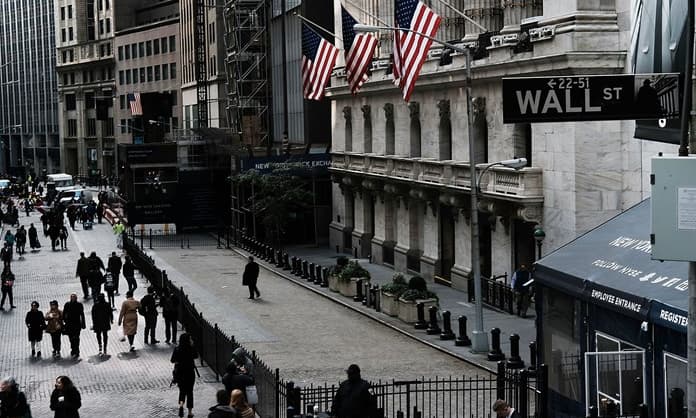Capitalist hoarders are gambling with our lives

Two US Republican senators offloaded several million dollars worth of stocks just before global share markets tumbled, and after receiving high level briefings about the the threat of the coronavirus, according to congressional reports. While panic selling their own assets, the senators were telling the public not to panic for their lives because the threat of COVID-19 was overstated. Investigative journalism website ProPublica reports that Senate Intelligence Committee chair Richard Burr, who was receiving daily briefings and had access to classified information about threats to national security, sold up to $1.7 million of his portfolio on 13 February – one week before Wall Street entered a precipitous decline.
A second senator, Kelly Loeffler – the wealthiest member of Congress and wife of New York Stock Exchange chair Jeffrey Sprecher – sold jointly-owned shares worth up to $3 million in the three weeks leading to 14 February. The first sale occurred on 24 January, “the very day that her committee, the Senate Health Committee, hosted a private, all-senators briefing from administration officials, including the [Centers for Disease Control and Prevention] director and Anthony Fauci, the head of the National Institute of Allergy and Infectious Diseases, on the coronavirus”, noted the Daily Beast’s Lachlan Markay, William Bredderman and Sam Brodey.
Loeffler and her husband live in a $10 million, 1,400 square metres estate in Atlanta. Four days into their sell-off, the Georgia senator tweeted: “Democrats have dangerously and intentionally misled the American people on #Coronavirus readiness. Here’s the truth: @realDonaldTrump & his administration are doing a great job working to keep Americans healthy & safe”. The two senators are rightly facing a storm of criticism and a looming Ethics Committee investigation. But while Barr and Loeffler are officials with a special responsibility to act in the public interest, the markets show that they are not the only multi-millionaires focused squarely on their own finances as the pandemic spreads.
More than US$6 trillion was wiped from the value shares globally in the last week of February. At least $6 trillion more has again been written down so far this month. The Dow Jones Industrial Average, an index tracking the value of 30 large companies listed on the New York Stock Exchange and the Nasdaq Stock Market, has plunged by one-third in the last 30 days. It’s a similar story across the world. The FTSE100 Index (London), the Hang Seng (Hong Kong), the Nikkei (Japan), the Stoxx 600 (a pan-European index) and the S&P/ASX 200 (Australia) have all cratered.
Wall Street trading volumes in the last week have roughly doubled to around 8 billion shares per day. Sales volumes on the Australian Securities Exchange have done the same. What does this mean? It means that owners of capital collectively worth trillions of dollars have spent the most recent period buying and selling at a frenzy, trying to mitigate losses and make quick gains. That’s right: while working people search from supermarket to supermarket trying to get a roll of toilet paper and a packet of pasta, and as hospitals and workplaces run short of the protective equipment that could help slow the spread of the deadly virus, the owners of capital are thinking about how to protect their own wealth and power.
The market mentality was captured perfectly by Jeremy Iron’s character John Tuld, merciless CEO of a Wall Street investment bank in the 2011 film Margin Call. “It’s just money. It’s made up. Pieces of paper with pictures on it so that we don’t have to kill each other just to get something to eat”, he reasoned to his head of sales while eating a sumptuous meal with wine as the economy outside collapsed. In the film, based on events leading to the 2008-09 financial crisis, the firm, on Tuld’s instruction, deliberately crashes the market to ensure its own survival. “It’s not wrong. And it’s certainly no different today than it’s ever been”, he continued. “It’s all just the same thing over and over – we just can’t help ourselves. And you and I can’t control it or stop it or even slow it. Or even so slightly alter it. We just react. And we make a lot of money if we get it right. And we get left by the side of the road if we get it wrong.”
We face a different type of crisis today than in 2008-09. Then, the crisis was triggered by frenzied speculation on the part of big finance; a trove of rotten investments being exposed as the US housing market cooled and then crashed, with banks around the world foreclosing on millions of homeowners who couldn’t make their payments when mass layoffs occurred. Today, the market crash is in anticipation of the acute recession caused by the global lockdown.
But the divergent reasoning of those at the top of society from those at the bottom remains the same. The working class and those without great wealth are desperate to hold on to or get a hold of useful things – their houses, food, toilet paper, protective equipment and jobs. Those at the top, meanwhile, are the world’s ugliest hoarders. In a crisis that threatens hundreds of thousands of lives (or more) and tens of millions of livelihoods, they’re obsessing over that useless paper that gives them control of the world.